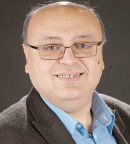Are second-generation bispecific antibodies the next big thing in lymphoma? Studies of these drugs were among the highlights of the 2019 American Society of Hematology (ASH) Annual Meeting & Exposition. Years ago, the bispecific T-cell engager blinatumomab validated the concept of bispecific antibodies in hematology. Blinatumomab, a first-generation CD3-CD19 bispecific T-cell engager, binds to CD19 on the surface of B cells and CD3 expressed on the surface of T cells. Blinatumomab is the first such agent to be approved by the U.S. Food and Drug Administration (FDA) in patients with relapsed or refractory B-cell acute lymphocytic leukemia (ALL).
Today, dozens of next-generation bispecific antibody constructs are in clinical trials, and they are poised to have a huge impact in the treatment of lymphoma and other hematologic malignancies, experts agreed.

Robert A. Brodsky, MD
Speaking at an ASH press briefing, ASH Secretary Robert A. Brodsky, MD, of Johns Hopkins University School of Medicine, told journalists that bispecific antibodies may be “the most exciting theme of the meeting.” The phase I study of one second-generation agent—mosunetuzumab—was highlighted among the ASH Plenary Session presentations. Mosunetuzumab is an off-the-shelf product, requiring no time for manufacturing, and appears to work well even in patients with advanced non-Hodgkin lymphoma (NHL) whose disease progresses after treatment with chimeric antigen receptor (CAR) T-cell therapy. In the study presented at the ASH meeting, high response rates were achieved, with good tolerability.1
“This is the most exciting of the plenary abstracts and represents a fundamental change in how we conceptualize the treatment of B-cell malignancies. Mosunetuzumab is basically an antibody that uses the patient’s own T cells to do what a CAR T cell would do. It’s an off-the-shelf product that gets around the problem of the time it takes to generate CAR T cells. Because it will be simpler and faster to produce, it’s likely to also be less expensive, and from the early results, it looks much less toxic,” Dr. Brodsky said.
“We need more follow-up with these approaches to see tolerability and durability, but if bispecific antibodies can do what CAR T cells can do, that would be a very big advance and would represent a paradigm shift. CAR T-cell therapies are here to stay, but the question is whether bispecific antibodies will encroach on them,” he commented.

Basem M. William, MD, MRCP (UK), FACP
Basem M. William, MD, MRCP (UK), FACP, Director of the T-Cell Lymphoma Program and Member of the Blood and Marrow Transplant Program at The Ohio State University Comprehensive Cancer Center, Columbus, agreed. “I think bispecific antibodies will take the ‘bite’ out of the CAR T-cell market. For one thing, treatment with an off-the-shelf product means that patients who are very ill will not have to wait for autologous T cells to be manufactured.”
How Bispecific Antibodies Work
Bispecific antibodies recognize two different epitopes. Having dual specificity, they can redirect T cells to tumor cells to enhance tumor killing, simultaneously block two different signaling pathways or mediators with unique or overlapping functions, interact with two different surface antigens, and deliver payloads to targeted sites. Their development was initially hampered by manufacturing difficulties, but newer constructs are more stable, easier to produce, and less immunogenic.
Two have been FDA approved—blinatumomab and catumaxomab—but more than 30 are now in clinical trials, and two-thirds are anticancer agents. The following studies presented at the ASH meeting demonstrate the potential of several of these newer drugs.
Mosunetuzumab

Stephen J. Schuster, MD
Mosunetuzumab binds to CD20 on the surface of malignant B cells and to CD3 on the surface of cytotoxic T cells, resulting in crosslinking of the T-cell receptor and subsequent activation of an immunologic T-cell response. Though only phase I, the study presented at the ASH Plenary Session was accepted, “because everyone wants to hear these data,” said Stephen J. Schuster, MD, of Abramson Cancer Center at the University of Pennsylvania, Philadelphia, who presented the study at the ASH meeting.1
The ASCO Post has reported full details of the mosunetuzumab study later in this issue. In brief, 270 patients with a poor prognosis were treated, many of whom had received CAR T-cell therapy previously. Among 193 patients evaluable for efficacy, 124 (65%) had aggressive lymphoma, and 67 (35%) had indolent lymphoma (but their cancer had failed to respond to other therapies). The objective response rate was 37% among patients with aggressive lymphomas, with 19% achieving complete remission; among patients with indolent lymphomas, the objective response rate was 63%, with 43% achieving complete remission. Of the 30 patients who had previous CAR T-cell therapy, 18 were evaluable, of whom 39% responded and 23% had complete responses.
“Some of the patients in the complete-response group are now off mosunetuzumab,” Dr. Schuster said. The hypothesis is that mosunetuzumab may help re-engage CAR T cells and boost the effect of prior CAR T-cell treatment.
Adverse events leading to treatment withdrawal occurred in 5.5% of patients. Cytokine-release syndrome and neurologic toxicity were mostly limited to grade 1 and 2.
REGN1979
A leading bispecific antibody is REGN1979, which targets CD20 and CD3. It was designed to cross-link and activate CD3-expressing T cells upon contact with CD20-positive B cells, thereby killing CD20-positive tumor cells independent of T-cell receptor recognition, according to lead investigator Rajat Bannerji, MD, PhD, of Rutgers Cancer Institute of New Jersey, who reported the first-in-human study results (dose-escalation and dose-expansion cohort) at the ASH meeting.2
KEY POINTS
- Second-generation bispecific antibodies for the treatment of lymphomas (and other malignancies) are hot items in the development pipeline.
- At the ASH meeting, impressive activity was reported for several agents, including efficacy in patients who experienced disease progression after CAR T-cell therapy.
- Mosunetuzumab was the subject of a Plenary Session presentation, highlighting the interest in this class of agents, although the study was phase I.
The study included 110 patients with relapsed or refractory NHL (55% with diffuse large B-cell lymphoma [DLBCL]) previously treated with anti-CD20 antibodies, including patients with progressive disease after anti-CD19 CAR T-cell therapy. Patients received 12 weekly intravenous doses of REGN1979, followed by every-2-week dosing for 12 doses (36 weeks total).
Response was assessed for patients treated with ≥ 80 mg who had a week 12 scan. For patients with DLBCL, the overall response rate was 58%, with 42% being complete responses. “All complete responders remained in complete response at data cutoff [median follow-up of 5.5 months],” Dr. Bannerji reported.
In patients without prior CAR T-cell therapy, the response rate rose to 71%, and all were complete responses. In patients who had prior CAR T-cell therapy, overall and complete response rates were 50% and 25%, respectively. Among patients with follicular lymphoma, 95% responded and 77% achieved a complete response. The median progression-free survival was 11.4 months for the follicular lymphoma subset, he reported.
The most common treatment-emergent adverse events were pyrexia, cytokine-release syndrome, chills, fatigue, and anemia; the most common grade ≥ 3 adverse events were anemia, hypophosphatemia, lymphopenia, and neutropenia, which were observed in about one-quarter of patients. Six patients discontinued treatment because of toxicity. Infections/infestations were reported in 50% of patients; in 20%, they were grade 3 or 4.
“At data cutoff, eight patients experienced a grade 3 immune-related reaction/cytokine-release syndrome, without a reported grade 4 or 5 event. One patient in the expansion cohort died of tumor-lysis syndrome; this patient had mantle cell lymphoma, blastoid variant with bone marrow involvement, and bulky disease,” he said.
In both aggressive and indolent subsets, baseline CD20 level did not predict response or nonresponse, but some disease progression may be associated with loss of CD20, Dr. Bannerji proposed. Programmed cell death ligand 1 (PD-L1) expression and programmed cell death protein 1 (PD-1)-positive tumor-infiltrating lymphocytes in malignant lymph node tissue were higher after REGN1979 treatment. “This suggests that these bispecific antibodies may have some synergy with checkpoint inhibitors,” he said.
“Step-up dosing and supportive care measures mitigated immune-related reactions and cytokine-release syndrome, and no patients discontinued treatment due to these events,” Dr. Bannerjee said. He added that enrollment has been halted “while a safety amendment is put together.” A global multiarm pivotal trial and additional studies are underway.
GEN3013
GEN3013 is the first subcutaneously administered IgG1 bispecific antibody that targets the CD3 and CD20, triggering T-cell–mediated killing of B cells.
GEN3013 has been evaluated in patients with advanced B-cell NHL (mostly aggressive forms) in a first-in-human phase I/II trial. At the ASH meeting, preliminary data from the dose-escalation phase were reported by Pieternella Lugtenburg, MD, PhD, of Erasmus MC Cancer Institute in Rotterdam.3

Pieternella Lugtenburg, MD, PhD
GEN3013 promotes T-cell activation and expansion, induces rapid T-cell–mediated killing of CD20-positive cells, dependent on simultaneous binding of CD3 and CD20, and retains activity in the presence of CD20 monoclonal antibodies, she said. “Compared with three other CD3 x CD20 bispecific antibodies, it showed significantly higher potency at lower doses in vitro. Preclinical data indicate the potential for a best-in-class therapy,” Dr. Lugtenburg said.
She reported early results in 31 patients who received a median of about six doses of GEN3013. Nearly two-thirds had DLBCL, and most were refractory to anti-CD20 therapy.
Antitumor activity was observed across aggressive and indolent B-cell NHL subtypes at low-dose levels. In doses of at least 0.76 mg, responses were achieved by 100% of patients with follicular lymphoma and 60% of patients with DLBCL.
Dose escalation resulted in no apparent increase in toxicities, and the maximum tolerated dose was not reached. No grade 3 or higher cytokine-release syndrome or neurologic toxicities were reported.
“The subcutaneous administration may offer advantages, such as slow absorption and lower Cmax, which reduces the risk of high-grade cytokine-release syndrome, along with efficient delivery of GEN3010 to lymph nodes and convenience for patients,” Dr. Lugtenburg said. Dose-escalation studies are ongoing, and new clinical studies will be conducted once the phase II dose is established.
DISCLOSURE: Dr. Brodsky has served as an advisor for Alexion and has received grants from Achillion. Dr. William has served as a consultant or advisor to Celgene, Guidepoint Global, Kyowa Hakko Kirin, miRagen, Navicor, and Triangle Insights; and has received research funding from Dova Pharmaceuticals, Incyte, Innate Pharma, Kite/Gilead, Merck, and miRagen. Dr. Schuster disclosed financial relationships with Celgene, Genentech, Merck, Pharmacyclics, Acerta, AbbVie, Gilead, Nordic Nanovector, Pfizer, AstraZeneca, Loxo Oncology, and Novartis and has patents or royalties for combination CAR T-cell and PD-1 inhibitor therapy. Dr. Bannerji disclosed financial relationships with AbbVie, Gilead, Pharmacyclics, Merck, Regeneron, and Celgene. Dr. Lugtenburg disclosed financial relationships with Janssen Cilag, Roche, Celgene, Servier, Genmab, BMS, and Takeda.
REFERENCES
1. Schuster SJ, Bartlett NL, Assouline S, et al: Mosunetuzumab induces complete remissions in poor prognosis non-Hodgkin lymphoma patients, including those who are resistant to or relapsing after chimeric antigen receptor T-cell therapies, and is active in treatment through multiple lines. 2019 ASH Annual Meeting & Exposition. Abstract 6. Presented December 8, 2019.
2. Bannerji R, Allan JN, Arnason JE, et al: Clinical activity of REGN1979, a bispecific human, anti-CD20 x anti-CD3 antibody, in patients with relapsed/refractory B-cell non-Hodgkin lymphoma. 2019 ASH Annual Meeting & Exposition. Abstract 762. Presented December 9, 2019.
3. Lugtenburg P, Mous R, Clausen MR, et al: First-in-human, phase I/II trial to assess the safety and clinical activity of subcutaneous GEN3013 (DuoBody-CD3/CD20) in B-cell non-Hodgkin lymphomas. 2019 ASH Annual Meeting & Exposition. Abstract 758. Presented December 9, 2019.

